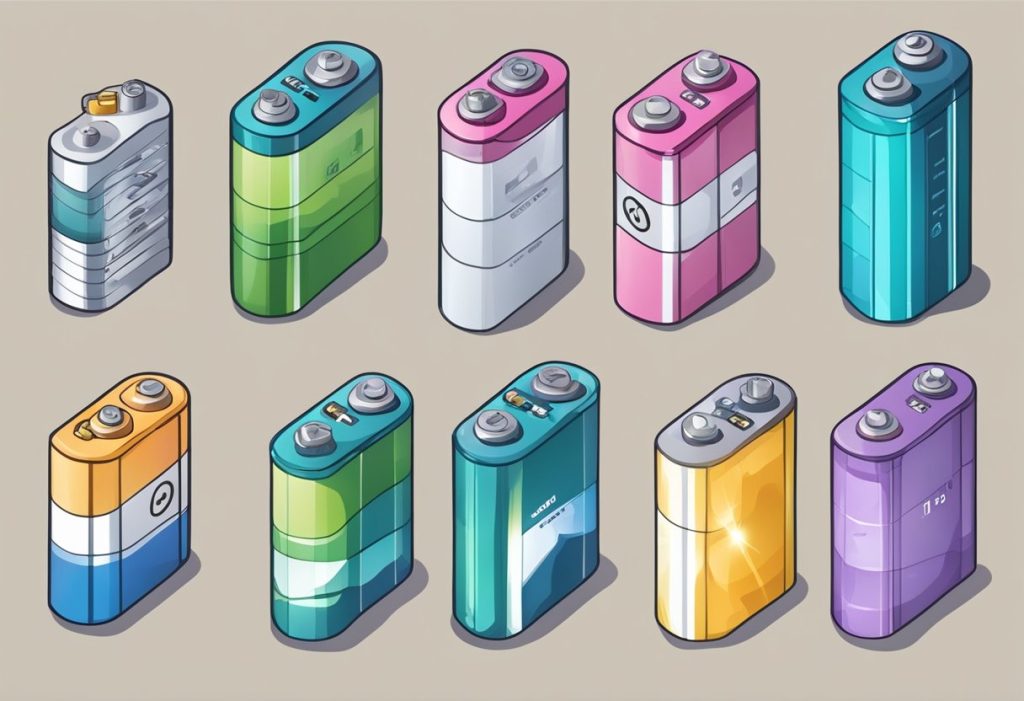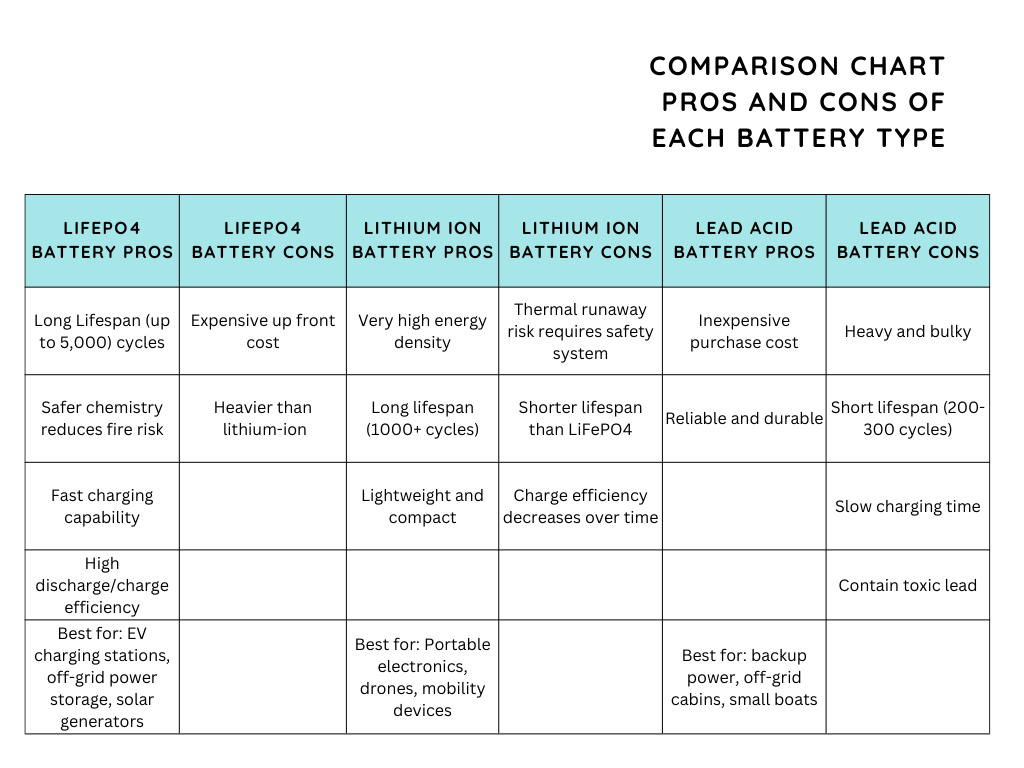RV and Vanlife Power: Should I Choose Lithium, LiFePO4 or Lead-Acid Batteries?
Pros and Cons of LiFePO4 vs Lithium Ion and Lead-Acid Batteries: A Comprehensive Comparison
When it comes to choosing the right battery for your needs, there are several options available in the market. Three of the most popular battery types are LiFePO4, lithium-ion, and lead-acid batteries. Each of these batteries has its own set of pros and cons, and choosing the right one can be a daunting task. In this article, we will explore the pros and cons of LifePO4 vs Lithium-ion and lead acid batteries to help you make an informed decision.

LiFePO4 batteries are a type of lithium-ion battery that has gained popularity in recent years due to their high energy density, long cycle life, and safety features. They are commonly used in applications such as electric vehicles, solar power systems, and portable electronics. On the other hand, lithium-ion batteries are widely used in smartphones, laptops, and other consumer electronics due to their high energy density and low self-discharge rate. Lead-acid batteries, on the other hand, have been widely used for decades and are commonly found in cars, UPS systems, and other applications that require a reliable and affordable power source.
Key Takeaways
- LiFePO4, lithium-ion, and lead-acid batteries are popular battery types used in various applications.
- LiFePO4 batteries offer high energy density, long cycle life, and safety features.
- Lithium-ion batteries are commonly used in consumer electronics, while lead-acid batteries are widely used in cars and UPS systems.
Understanding LiFePO4, Lithium Ion and Lead-Acid Batteries

Batteries are an essential component of many electronic devices. They store energy and provide power to the device when needed. There are many types of batteries available in the market, but three of the most common types are LiFePO4, lithium-ion, and lead-acid batteries. In this section, we will provide a brief overview of each type of battery.
Defining LiFePO4 Batteries
LiFePO4 batteries are a type of rechargeable battery that has gained popularity in recent years. They are known for their long lifespan, quick charging time, high efficiency, and safety. LiFePO4 batteries are made up of lithium iron phosphate and have a nominal voltage of 3.2 volts per cell. They are commonly used in applications such as electric vehicles, solar power systems, and backup power systems.
Defining Lithium Ion Batteries
Lithium-ion batteries are another type of rechargeable battery that is widely used in electronic devices. They are known for their high energy density, lightweight, and long cycle life. Lithium-ion batteries are made up of lithium cobalt oxide, lithium manganese oxide, or lithium iron phosphate and have a nominal voltage of 3.6-3.7 volts per cell. They are commonly used in applications such as smartphones, laptops, and cameras.
Defining Lead-Acid Batteries
Lead-acid batteries are the oldest and most common type of rechargeable battery. They are known for their low cost, reliability, and ability to deliver high currents. Lead-acid batteries are made up of lead plates and sulfuric acid and have a nominal voltage of 2 volts per cell. They are commonly used in applications such as cars, motorcycles, and boats.
In summary, LiFePO4 batteries are known for their long lifespan, quick charging time, high efficiency, and safety. Lithium-ion batteries are known for their high energy density, lightweight, and long cycle life. Lead-acid batteries are known for their low cost, reliability, and ability to deliver high currents. Each type of battery has its own advantages and disadvantages, and the choice of battery depends on the specific application and requirements.
Pros and Cons of Lifepo4 Batteries
Advantages of Lifepo4 Batteries
Lifepo4 batteries have several advantages over other types of batteries. Here are some of them:
- Longer lifespan: Lifepo4 batteries have a longer lifespan compared to lead-acid and lithium-ion batteries. They can last up to five times longer than lead-acid batteries and two times longer than lithium-ion batteries. This means that they require less maintenance and replacement over time, which saves you money in the long run.
- Safety: Lifepo4 batteries are safer than other types of batteries. They do not contain any hazardous materials, making them more eco-friendly. They are also less likely to catch fire or explode, which makes them ideal for use in high-risk applications.
- Stability: Lifepo4 batteries are more stable than other types of batteries. They have a high thermal and structural stability due to lithium iron phosphate. This makes them less likely to degrade or suffer from thermal runaway, which can cause damage to the battery and surrounding equipment.
- Efficiency: Lifepo4 batteries are more efficient than other types of batteries. They have a higher energy density and can deliver more power over a longer period of time. This makes them ideal for use in high-demand applications, such as electric vehicles and renewable energy systems.
Disadvantages of Lifepo4 Batteries
While Lifepo4 batteries have several advantages, they also have a few disadvantages. Here are some of them:
- Cost: Lifepo4 batteries are more expensive than lead-acid batteries and some lithium-ion batteries. This can make them less accessible for some applications, especially those with a tight budget.
- Weight and Size: Lifepo4 batteries are heavier and larger than some lithium-ion batteries. This can make them less suitable for applications where weight and size are critical factors.
- Voltage: Lifepo4 batteries have a lower voltage than some other types of batteries. This means that they may not be suitable for applications that require high voltage output.
Pros and Cons of Lithium Ion Batteries
Advantages of Lithium Ion Batteries
Lithium ion batteries have become increasingly popular due to their numerous advantages over other battery types. Here are some of the main advantages of lithium ion batteries:
- High energy density: Lithium ion batteries have a high energy density, meaning they can store a lot of energy in a small and lightweight package. This makes them ideal for portable devices such as laptops, smartphones, and electric vehicles.
- Low self-discharge rate: Lithium ion batteries have a low self-discharge rate, meaning they can hold their charge for a long time without losing a significant amount of energy. This makes them ideal for devices that are not used frequently or that need to be stored for long periods of time.
- Fast charging: Lithium ion batteries can be charged quickly, which is a huge advantage for portable devices that need to be charged on the go.
- Long lifespan: Lithium ion batteries have a longer lifespan than other battery types, which means they need to be replaced less frequently.
Disadvantages of Lithium Ion Batteries
While lithium ion batteries have many advantages, they also have some disadvantages. Here are some of the main disadvantages of lithium ion batteries:
- Cost: Lithium ion batteries are more expensive than other battery types, which can be a significant disadvantage for some applications.
- Safety concerns: Lithium ion batteries can be dangerous if they are not handled properly. They can overheat and catch fire or explode if they are damaged or exposed to high temperatures.
- Environmental impact: Lithium ion batteries contain toxic chemicals that can be harmful to the environment if they are not disposed of properly.
Overall, lithium ion batteries are a great choice for many applications due to their high energy density, fast charging, and long lifespan. However, they do have some disadvantages that need to be considered before choosing them for a particular application.
Pros and Cons of Lead-Acid Batteries
Lead-acid batteries have been around for over 150 years and are still widely used today. They have their advantages and disadvantages, which we will discuss below.
Advantages of Lead-Acid Batteries
- Recyclability: Lead-acid batteries are recyclable and have a high recycling rate. The lead and acid components can be recycled and used to manufacture new batteries, which makes them an environmentally friendly option. Additionally, lead-acid batteries are easy to dispose of, which makes them a safe option for various applications.
- Low Cost: Lead-acid batteries are relatively inexpensive compared to other types of batteries. This makes them a popular choice for applications where cost is a primary concern.
- Reliability: Lead-acid batteries are known for their reliability. They can withstand extreme temperatures and are resistant to shock and vibration. This makes them a good choice for applications where batteries need to be durable and long-lasting.
Disadvantages of Lead-Acid Batteries
- Limited Energy Density: Lead-acid batteries have a lower energy density compared to other types of batteries. This means they have a shorter lifespan and require more frequent charging.
- Heavy: Lead-acid batteries are heavy and bulky, which makes them unsuitable for applications where weight is a concern.
- Maintenance: Lead-acid batteries require regular maintenance to ensure they operate at peak performance. This includes checking the water levels and performing periodic equalization charges.
Lead-acid batteries are a reliable and cost-effective option for a variety of applications. However, they have a limited energy density, are heavy, and require regular maintenance.
Pros and Cons of LiFePO4 vs Lithium Ion and Lead-Acid Batteries

Frequently Asked Questions for Pros and Cons of LiFePO4 vs Lithium Ion and Lead-Acid Batteries
What are the advantages of using LiFePO4 batteries over lead-acid batteries?
LiFePO4 batteries have several advantages over lead-acid batteries. They have a longer lifespan, higher energy density, and faster charging times. They also have a lower self-discharge rate, which means they can be stored for longer periods without losing their charge. Additionally, LiFePO4 batteries are more environmentally friendly as they don't contain toxic lead-acid.
What are the disadvantages of using lithium-ion batteries in solar applications?
Lithium-ion batteries may not be the best choice for solar applications due to their higher cost and sensitivity to high temperatures. They also require a specialized battery management system to prevent overcharging or discharging, which can be expensive.
How does the safety of lead-acid batteries compare to that of lithium-ion batteries?
Lead-acid batteries are generally considered safe as they don't pose a significant risk of thermal runaway or overheating. However, they do contain toxic lead and acid, which can be harmful to the environment and human health. On the other hand, lithium-ion batteries have a higher risk of thermal runaway and overheating, which can lead to battery fires. However, LiFePO4 batteries are considered safer than lithium-ion batteries due to their stable chemistry and lower risk of thermal runaway.
What are the benefits of using LiFePO4 batteries in electric vehicles?
LiFePO4 batteries are an excellent choice for electric vehicles due to their high energy density, longer lifespan, and faster charging times. They also have a lower self-discharge rate, which means they can be stored for longer periods without losing their charge. Additionally, LiFePO4 batteries are more environmentally friendly as they don't contain toxic lead-acid.
What are the differences in charging LiFePO4 and lead-acid batteries?
LiFePO4 batteries require a specialized charger that can deliver a constant voltage and current to prevent overcharging or discharging. Lead-acid batteries, on the other hand, can be charged using a standard charger. Additionally, LiFePO4 batteries can be charged much faster than lead-acid batteries.
Which is better for a motorcycle battery, lead-acid or lithium-ion?
Lithium-ion batteries are generally considered better for motorcycle batteries due to their higher energy density, longer lifespan, and faster charging times. They are also lighter and more compact than lead-acid batteries, which can be beneficial for motorcycles. However, they do require a specialized battery management system to prevent overcharging or discharging, which can be expensive.
What's the best battery type for solar generators?
LiFePO4 batteries are the top choice for solar generators and renewable energy storage. Their long lifespan, fast charging, and high efficiency make them ideal for solar pairing.
Can lithium-ion batteries be used for EV charging stations?
While lithium-ion batteries work for small capacity EV charging, LiFePO4 is better suited for higher capacity rapid charging stations. LiFePO4 has higher charge efficiency and better longevity.
Is lead-acid or lithium-ion better for a backup UPS (uninterruptible power supply) system?
For UPS backup power, sealed lead-acid batteries provide a reliable and low-cost option. However, lithium-ion can provide longer runtimes from a more compact battery.
What battery type is best for an off-grid cabin?
For small off-grid solar systems, sealed lead-acid batteries are a common choice due to low cost. For larger systems or longer runtimes, LiFePO4 provides better longevity and efficiency.
